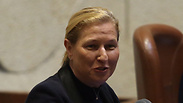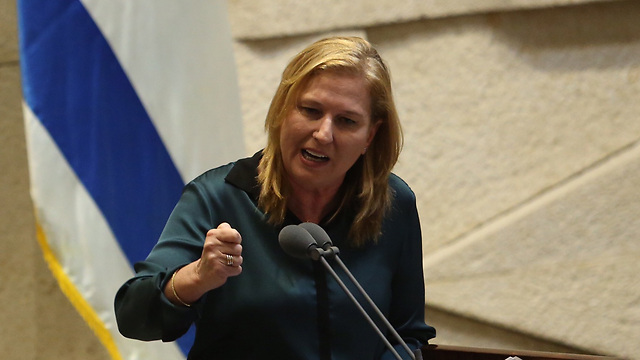
MK Tzipi Livni
צלום: גיל יוחנן
Livni says British police sought to question her
The former foreign minister was summoned by the British police over her role in the 2008-2009 Operation Cast Lead in Gaza; the MK, on a private visit to London, called the non-mandatory summons 'unacceptable' and did not comply.
Former foreign minister MK Tzipi Livni said on Monday that a British war crimes investigator sought to question her during a trip to Britain over her role in the 2008-2009 Operation Cast Lead in Gaza.
Livni arrived in London on Saturday night to attend a conference of the Jewish community in the city, after British police emailed her a summons on Friday.
The police request, which Livni dubbed "unacceptable," defined the questioning as non-mandatory, and she did not comply.
Israel's Foreign Ministry said it views the British request "with great concern" and would "engage" with British authorities until the matter is resolved. Britain's Foreign Office, the Metropolitan Police in London and Scotland Yard declined comment.
Livni, a one-time lead peace negotiator with the Palestinians, enjoys a dovish reputation in much of the West. But she staunchly defends Israel's three-week military offensive in Gaza in 2008-2009, which was meant to end years of rocket fire by Gaza militants against Israel. There was widespread international criticism of the hundreds of civilian casualties.
Livni served as foreign minister during the war, and as a member of the security cabinet, she was part of the decision-making process regarding the military campaign.
Pro-Palestinian groups have previously tried to go after Livni and other Israeli officials using universal jurisdiction, a principle that lets British courts prosecute foreigners accused of crimes against humanity wherever they were committed.
The law strained UK-Israeli relations, as senior Israeli officials canceled trips rather than face possible arrest in Britain. In 2009, an arrest warrant was issued in Britain against Livni, and Israel's Foreign Ministry said the warrant was later canceled, after officials learned Livni was not on British soil.
Previously, anyone in Britain could apply to a judge for such warrants. But the law was amended in 2011 to make such arrest warrants harder to pursue. That year, Britain's chief prosecutor blocked an attempt to serve Livni with an arrest warrant during a visit to Britain.
British officials extend diplomatic immunity to Israeli officials to shield them from such arrests.
However, Livni said she declined immunity for her current trip to Britain on principle. She said she wanted to test what British authorities would do in cases of Israelis who are not eligible for diplomatic immunity but who could be pursued for alleged war crimes.
"Israeli army commanders and Israeli decision makers who are threatened with arrest warrants each time they arrive in London -- this is an absurd sight that is unacceptable and must stop," Livni wrote on Facebook.
"Just as we respect and admire Britain's actions against international terror and Israel is open for any British minister to visit, without questions about his decisions in the cabinet, such is how Israel expects from Britain," she added.











